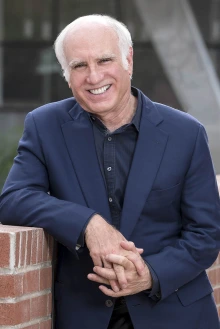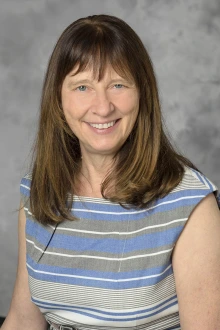Lane and Weihs named American Psychosomatic Society fellows
Richard D. Lane, MD, PhD, a tenured professor of psychiatry at the University of Arizona College of Medicine – Tucson, and Karen Weihs, MD, a tenured professor of psychiatry at the College of Medicine – Tucson, were named fellows in the American Psychosomatic Society.
The APS’s mission is to advance and integrate the scientific study of biological, psychological, behavioral and social factors in health and disease. Fellow status in the APS is “designed to recognize sustained excellence in scholarship and professional contributions to the field of psychosomatic science and commitment to the society among members who are mid-career and beyond.”
Lane and Weihs have been life partners since 2001.
Richard D. Lane, MD, PhD
On being named a fellow in the APS, Lane said: “It feels great to be recognized by an organization that in many ways has been the focal point of my career. In my final year of medical school, I became fascinated with the field of psychosomatic medicine, which seeks to understand the mechanisms by which mind, brain, body and social context influence medical outcomes.”

Richard D. Lane, MD, PhD
Lane, who also has faculty appointments in the departments of psychology and neuroscience in the College of Science, served as APS president from 2005-2006 and was on the APS Council for nine years. He has led other APS initiatives, including promoting neuroscience research in psychosomatic medicine and creating a “Young Investigator Colloquium” at the annual meeting that helps early career scientists get their first grant.
Emotions are the focus of Lane’s current research. “Emotions make life worth living, but can also make life miserable,” he said. “Although emotions are not fully within our control, the ability to be aware of our own emotions makes regulating them possible and can provide an invaluable guide in dealing with difficulties and optimizing life experiences. I’ve therefore tried to understand how emotions work in the brain and body, how we can learn to become aware of them and regulate them, how they can affect the onset and progression of physical conditions such as heart disease and pain, and how we can make changes in the way we handle emotions to optimize physical and mental health.”
Lane joined the UArizona in 1990. “I came here first and foremost because of the opportunity to perform the first functional neuroimaging studies of emotional states, which we succeeded in publishing in 1997,” he said.
“The University of Arizona excels in supporting inter-disciplinary collaboration, which is ideal for the kind of research interests I have,” Lane said. “I feel fortunate to have been given the opportunity to practice, teach and do research here for the past 33 years. I have achieved more than I thought possible, and I truly believe that this would not have occurred without the excellent faculty, trainees and research infrastructure here at the University of Arizona.
“There are so many faculty members to thank, but I’d highlight Gary Schwartz, PhD, a professor of psychology, medicine, neurology, psychiatry and surgery at the UArizona, who was my first research mentor and PhD dissertation supervisor. I would also like to thank Lynn Nadel, PhD, UArizona Regents Professor emeritus, who was instrumental in creating an outstanding cognitive neuroscience program here and co-edited two books with me,” said Lane.
Karen Weihs, MD
“I feel honored to be among the distinguished scientists who lead the APS,” said Weihs, who is also an associate professor of family and community medicine. “Together we are demonstrating the mechanisms through which the brain, the mind and the social world influence physical health, and I hope this will bring more integration of mental health and physical health care in the years to come.”

Karen Weihs, MD
She held leadership roles in APS including president elect and president, served on the APS Council, participated as a member of the membership committee and mentored at the Young Investigator Workshops.
Weihs’ primary area of research investigates personal relationships and emotions of women with breast cancer. “I look at how the quality of marriage, extended family, friends and community relationships can buffer the way stressful experiences change the body’s ability to fight cancer,” she said. “I also test interventions to identify and treat anxiety and depression in cancer patients, including interventions with psychotherapy, art therapy and martial arts.”
Weihs joined the UArizona in 2005. “I am grateful to Dave Alberts, MD, who was my mentor when I arrived at the university. He facilitated my engagement with the cancer prevention and control program and supported the application of my clinical skills to building Supportive Care and Psychosocial Services at the Cancer Center,” Weihs said. Alberts passed away in July. “The shared services at the Cancer Center are a tremendous asset to support scientific investigations related to cancer.”
“I also want to thank Raymond Nagle, MD, PhD, from the Department of Pathology, who guided me in studying differences in breast cancer and non-cancer cells that respond to estrogen, progesterone and oxytocin, which was a crucial skill I needed for my research,” Dr. Weihs said.
“The University of Arizona has been a great place to work collaboratively with faculty from across the main campus and the medical center. It has been my privilege and a great pleasure to collaborate with Psychology Department faculty and faculty from the College of Nursing. Support from the UArizona Department of Psychiatry has made it possible for me to juggle being a clinician, a teacher, an administrator and a scientist, providing flexibility in the way I spend my time as opportunities arose for me to continue my professional growth.”

